Phân tích giá trị cảm xúc của những lời bình luận bởi giám khảo trong Thần tượng âm nhạc Mĩ theo Thuyết đánh giá
Bài báo tập trung nghiên cứu ngôn ngữ cảm xúc trong những lời bình luận của những giám khảo trong thần tượng âm nhạc Mĩ theo Thuyết đánh giá của Martin và White năm 2005. Bài báo dựa trên lí thuyết của Thuyết đánh giá, cụ thể là giá trị cảm xúc và các tiểu loại như Un/Happiness, Dis/ Inclination, In/ Security, Dis/ Satisfaction. Thêm vào đó, bài báo trình bày dữ liệu và phương pháp nghiên cứu được áp dụng. Kết quả nghiên cứu cho thấy tất cả các tiểu loại của giá trị cảm xúc đều được sử dụng trong ngôn ngữ của giám khảo tại Thần tượng âm nhạc Mĩ và có nhiều điểm khác trong việc nhận ra giá trị cảm xúc.
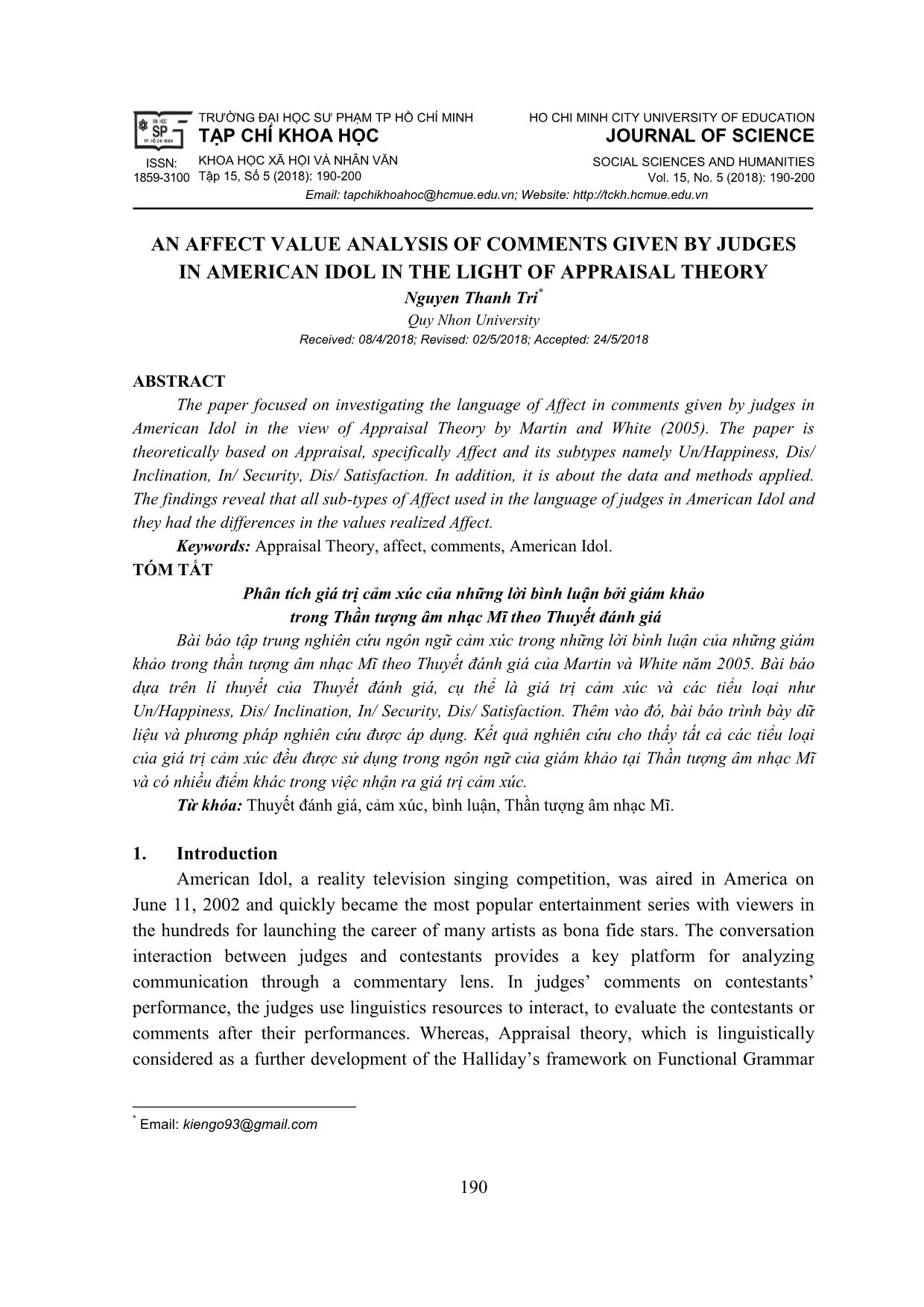
Trang 1
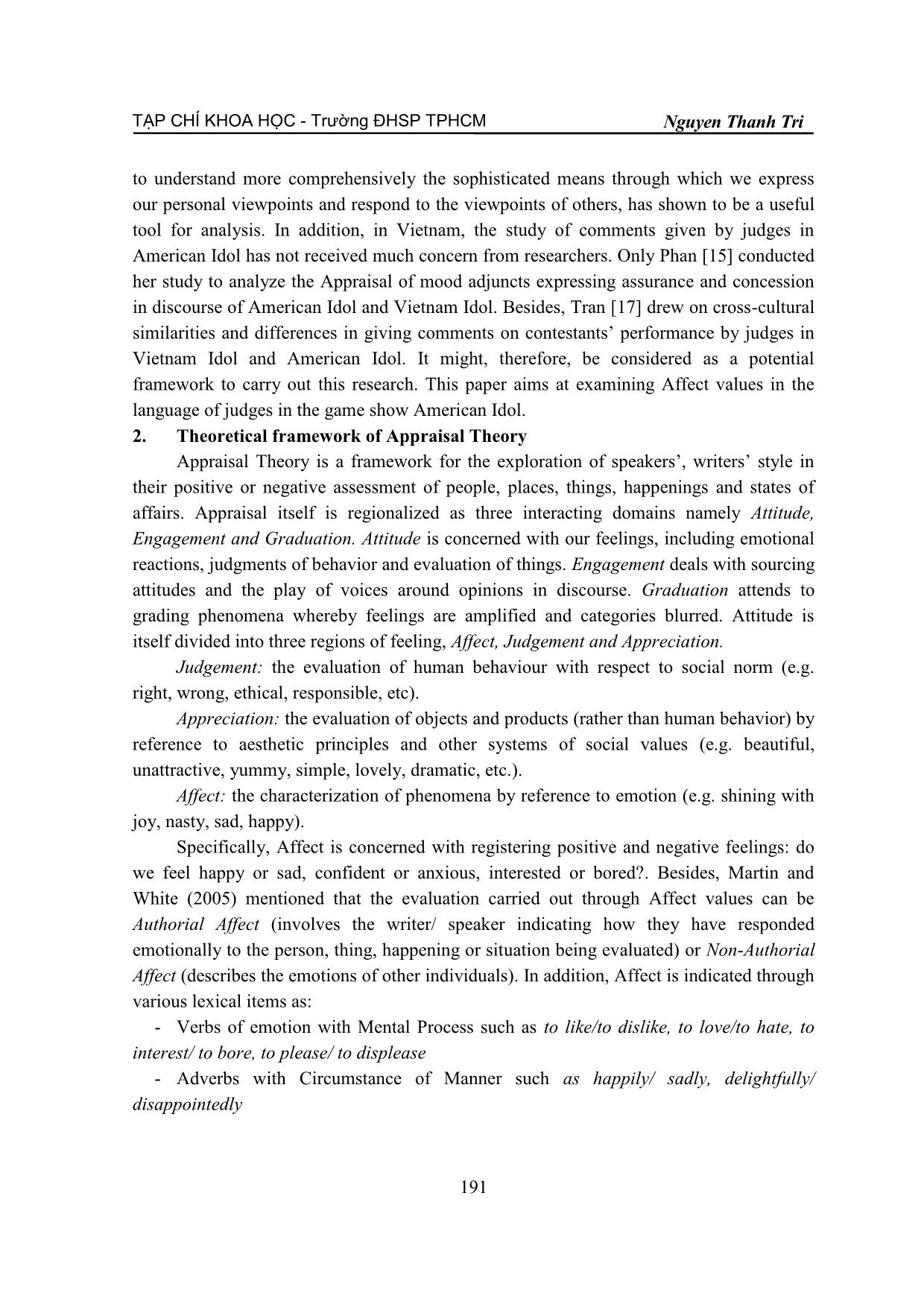
Trang 2
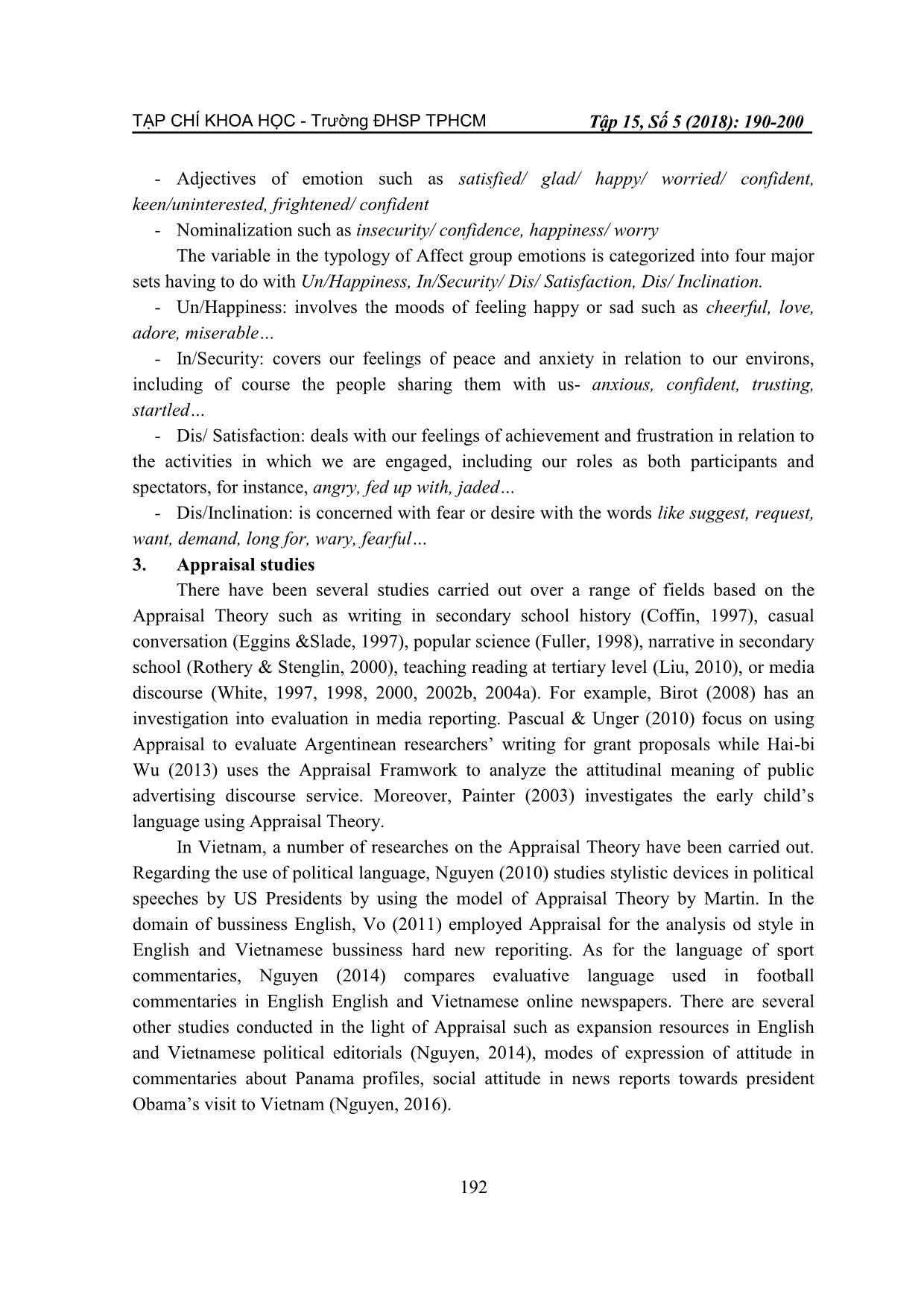
Trang 3
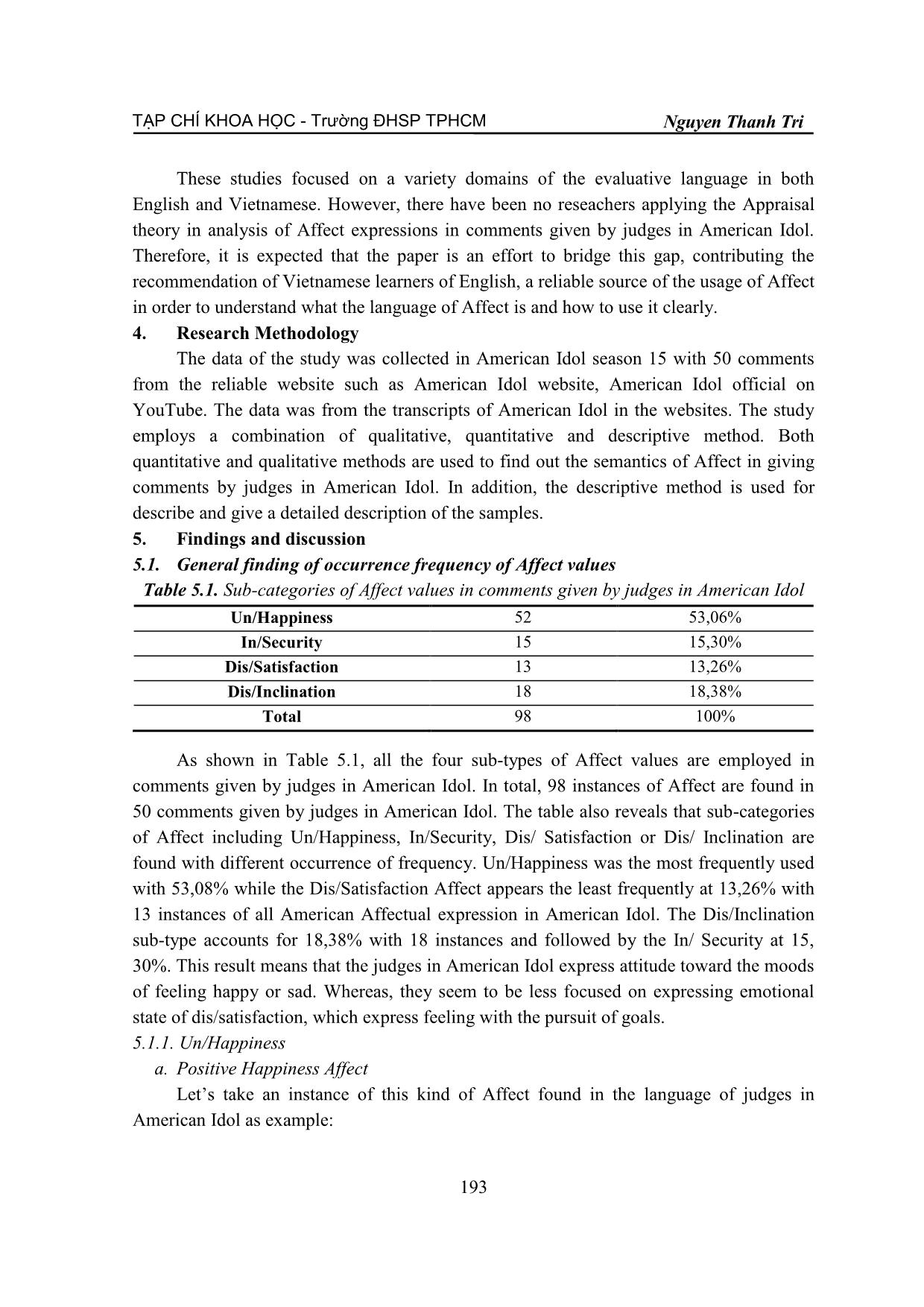
Trang 4
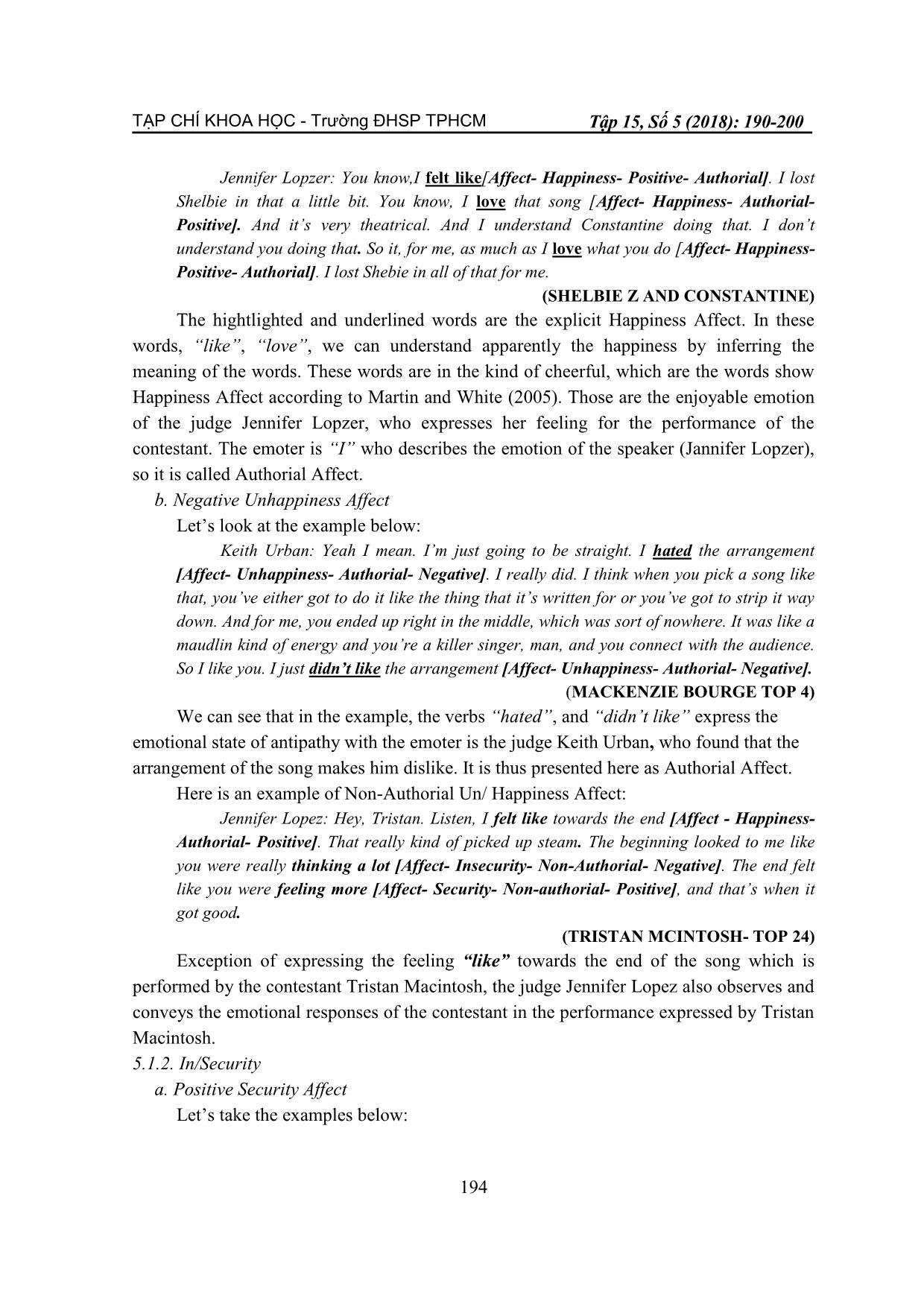
Trang 5
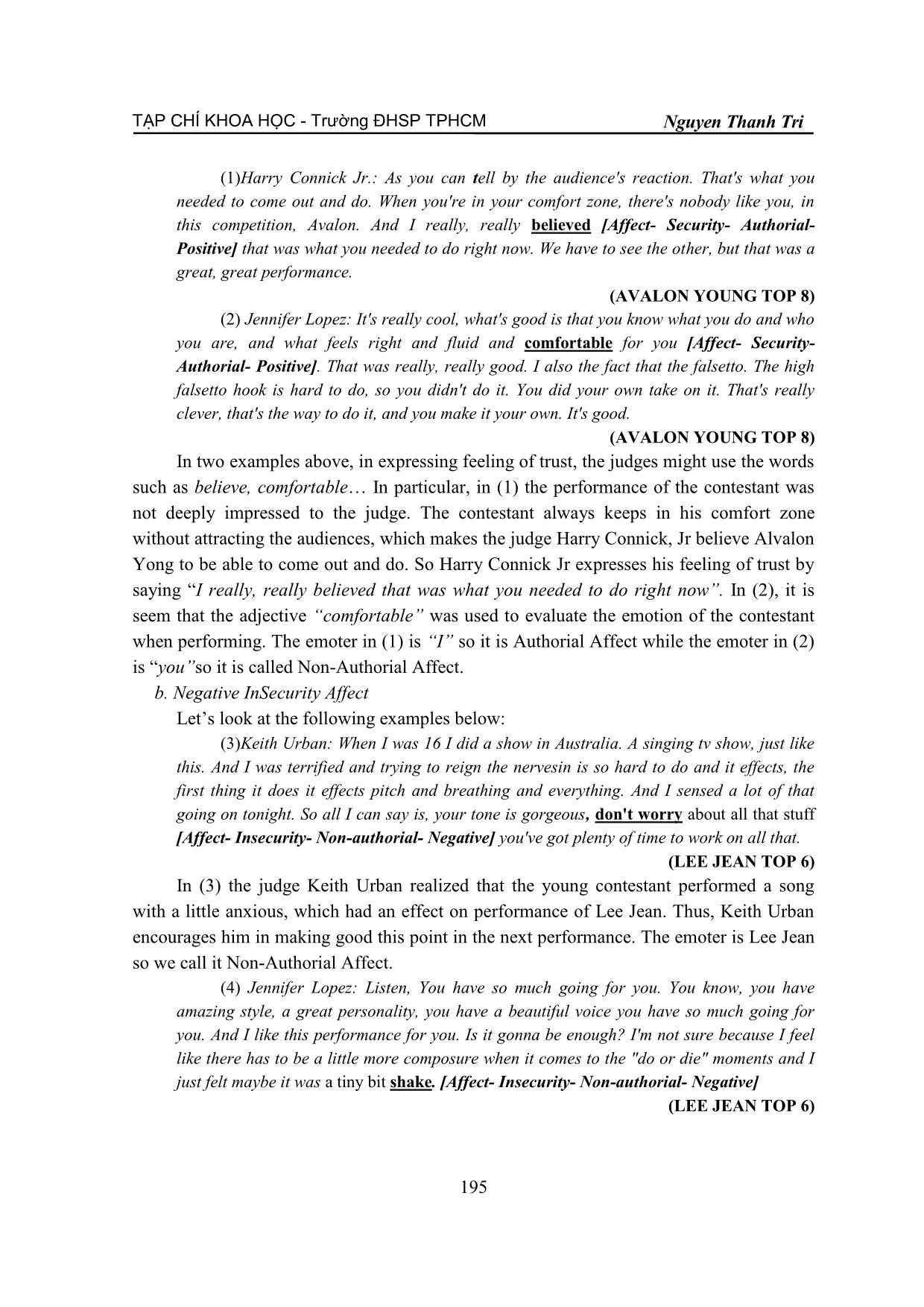
Trang 6
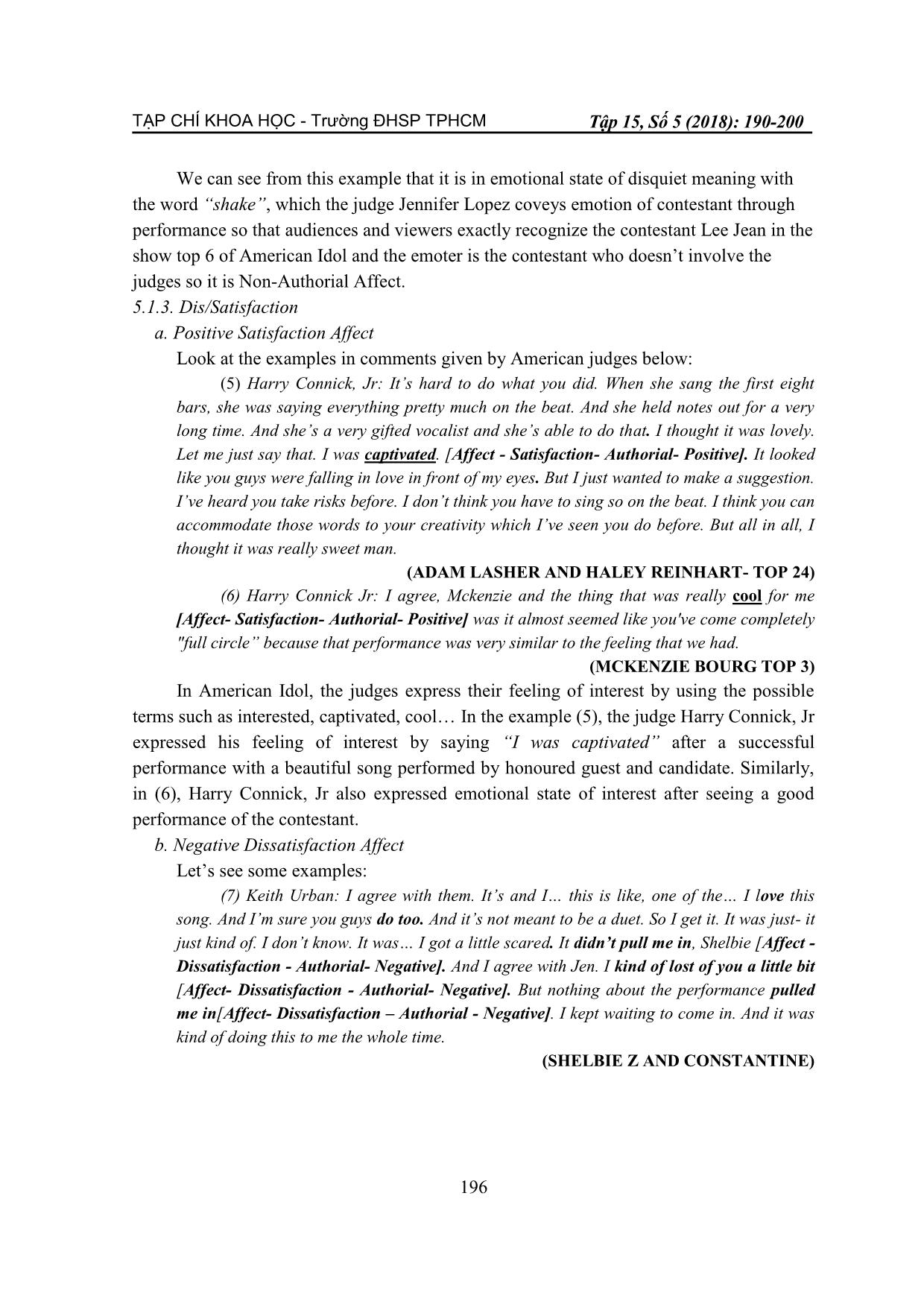
Trang 7
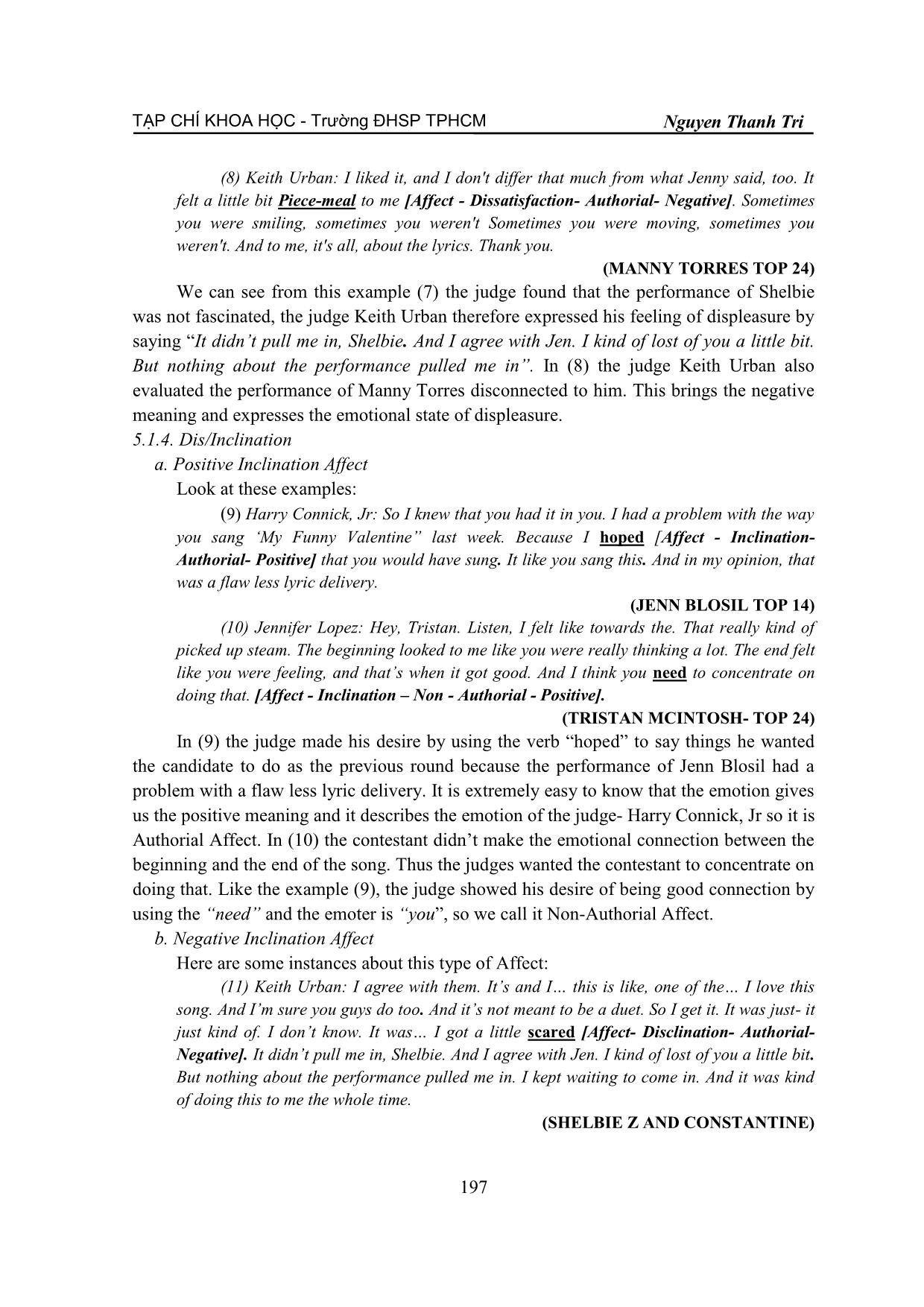
Trang 8
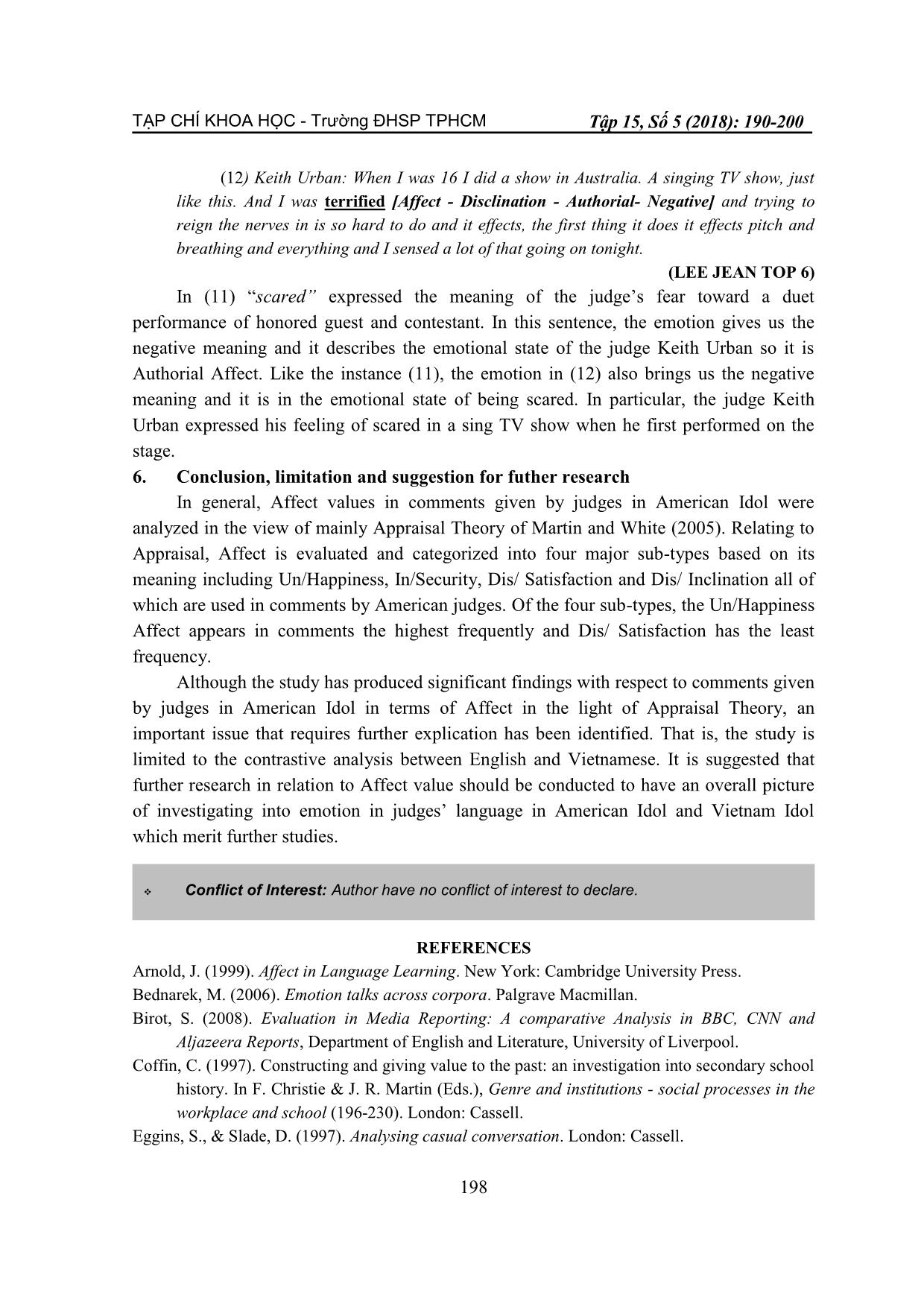
Trang 9
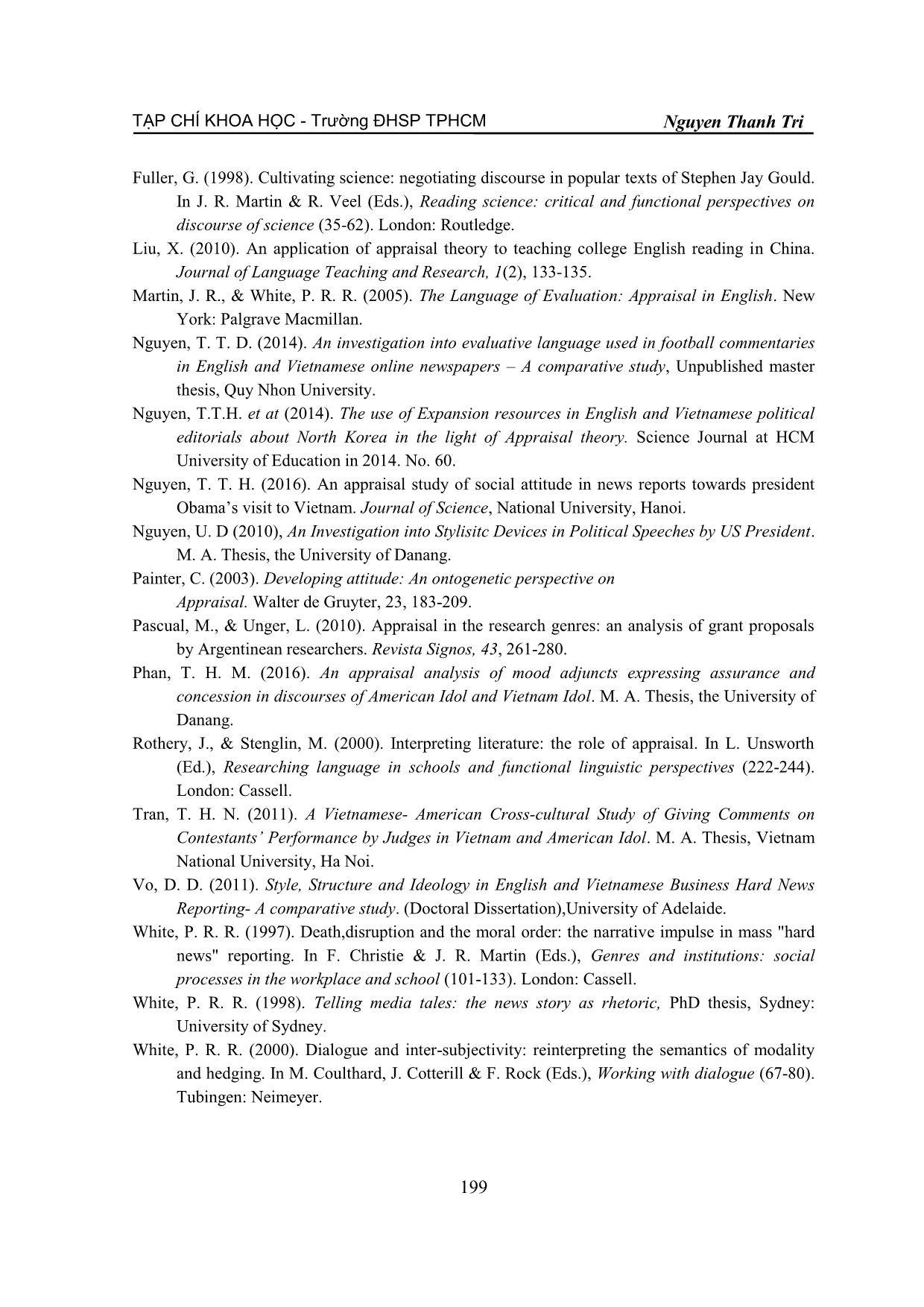
Trang 10
Tải về để xem bản đầy đủ
Bạn đang xem 10 trang mẫu của tài liệu "Phân tích giá trị cảm xúc của những lời bình luận bởi giám khảo trong Thần tượng âm nhạc Mĩ theo Thuyết đánh giá", để tải tài liệu gốc về máy hãy click vào nút Download ở trên
Tóm tắt nội dung tài liệu: Phân tích giá trị cảm xúc của những lời bình luận bởi giám khảo trong Thần tượng âm nhạc Mĩ theo Thuyết đánh giá
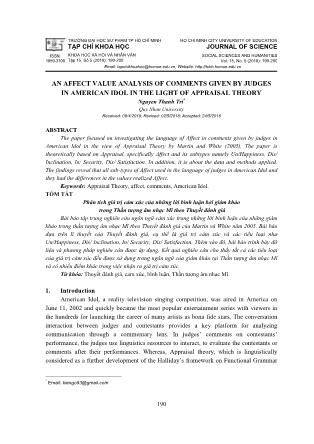
TRƯỜNG ĐẠI HỌC SƯ PHẠM TP HỒ CHÍ MINH TẠP CHÍ KHOA HỌC HO CHI MINH CITY UNIVERSITY OF EDUCATION JOURNAL OF SCIENCE ISSN: 1859-3100 KHOA HỌC XÃ HỘI VÀ NHÂN VĂN Tập 15, Số 5 (2018): 190-200 SOCIAL SCIENCES AND HUMANITIES Vol. 15, No. 5 (2018): 190-200 Email: tapchikhoahoc@hcmue.edu.vn; Website: 190 AN AFFECT VALUE ANALYSIS OF COMMENTS GIVEN BY JUDGES IN AMERICAN IDOL IN THE LIGHT OF APPRAISAL THEORY Nguyen Thanh Tri * Quy Nhon University Received: 08/4/2018; Revised: 02/5/2018; Accepted: 24/5/2018 ABSTRACT The paper focused on investigating the language of Affect in comments given by judges in American Idol in the view of Appraisal Theory by Martin and White (2005). The paper is theoretically based on Appraisal, specifically Affect and its subtypes namely Un/Happiness, Dis/ Inclination, In/ Security, Dis/ Satisfaction. In addition, it is about the data and methods applied. The findings reveal that all sub-types of Affect used in the language of judges in American Idol and they had the differences in the values realized Affect. Keywords: Appraisal Theory, affect, comments, American Idol. TÓM TẮT Phân tích giá trị cảm xúc của những lời bình luận bởi giám khảo trong Thần tượng âm nhạc Mĩ theo Thuyết đánh giá Bài báo tập trung nghiên cứu ngôn ngữ cảm xúc trong những lời bình luận của những giám khảo trong thần tượng âm nhạc Mĩ theo Thuyết đánh giá của Martin và White năm 2005. Bài báo dựa trên lí thuyết của Thuyết đánh giá, cụ thể là giá trị cảm xúc và các tiểu loại như Un/Happiness, Dis/ Inclination, In/ Security, Dis/ Satisfaction. Thêm vào đó, bài báo trình bày dữ liệu và phương pháp nghiên cứu được áp dụng. Kết quả nghiên cứu cho thấy tất cả các tiểu loại của giá trị cảm xúc đều được sử dụng trong ngôn ngữ của giám khảo tại Thần tượng âm nhạc Mĩ và có nhiều điểm khác trong việc nhận ra giá trị cảm xúc. Từ khóa: Thuyết đánh giá, cảm xúc, bình luận, Thần tượng âm nhạc Mĩ. 1. Introduction American Idol, a reality television singing competition, was aired in America on June 11, 2002 and quickly became the most popular entertainment series with viewers in the hundreds for launching the career of many artists as bona fide stars. The conversation interaction between judges and contestants provides a key platform for analyzing communication through a commentary lens. In judges’ comments on contestants’ performance, the judges use linguistics resources to interact, to evaluate the contestants or comments after their performances. Whereas, Appraisal theory, which is linguistically considered as a further development of the Halliday’s framework on Functional Grammar * Email: kiengo93@gmail.com TẠP CHÍ KHOA HỌC - Trường ĐHSP TPHCM Nguyen Thanh Tri 191 to understand more comprehensively the sophisticated means through which we express our personal viewpoints and respond to the viewpoints of others, has shown to be a useful tool for analysis. In addition, in Vietnam, the study of comments given by judges in American Idol has not received much concern from researchers. Only Phan [15] conducted her study to analyze the Appraisal of mood adjuncts expressing assurance and concession in discourse of American Idol and Vietnam Idol. Besides, Tran [17] drew on cross-cultural similarities and differences in giving comments on contestants’ performance by judges in Vietnam Idol and American Idol. It might, therefore, be considered as a potential framework to carry out this research. This paper aims at examining Affect values in the language of judges in the game show American Idol. 2. Theoretical framework of Appraisal Theory Appraisal Theory is a framework for the exploration of speakers’, writers’ style in their positive or negative assessment of people, places, things, happenings and states of affairs. Appraisal itself is regionalized as three interacting domains namely Attitude, Engagement and Graduation. Attitude is concerned with our feelings, including emotional reactions, judgments of behavior and evaluation of things. Engagement deals with sourcing attitudes and the play of voices around opinions in discourse. Graduation attends to grading phenomena whereby feelings are amplified and categories blurred. Attitude is itself divided into three regions of feeling, Affect, Judgement and Appreciation. Judgement: the evaluation of human behaviour with respect to social norm (e.g. right, wrong, ethical, responsible, etc). Appreciation: the evaluation of objects and products (rather than human behavior) by reference to aesthetic principles and other systems of social values (e.g. beautiful, unattractive, yummy, simple, lovely, dramatic, etc.). Affect: the characterization of phenomena by reference to emotion (e.g. shining with joy, nasty, sad, happy). Specifically, Affect is concerned with registering positive and negative feelings: do we feel happy or sad, confident or anxious, i ... ood. (AVALON YOUNG TOP 8) In two examples above, in expressing feeling of trust, the judges might use the words such as believe, comfortable In particular, in (1) the performance of the contestant was not deeply impressed to the judge. The contestant always keeps in his comfort zone without attracting the audiences, which makes the judge Harry Connick, Jr believe Alvalon Yong to be able to come out and do. So Harry Connick Jr expresses his feeling of trust by saying “I really, really believed that was what you needed to do right now”. In (2), it is seem that the adjective “comfortable” was used to evaluate the emotion of the contestant when performing. The emoter in (1) is “I” so it is Authorial Affect while the emoter in (2) is “you”so it is called Non-Authorial Affect. b. Negative InSecurity Affect Let’s look at the following examples below: (3)Keith Urban: When I was 16 I did a show in Australia. A singing tv show, just like this. And I was terrified and trying to reign the nervesin is so hard to do and it effects, the first thing it does it effects pitch and breathing and everything. And I sensed a lot of that going on tonight. So all I can say is, your tone is gorgeous, don't worry about all that stuff [Affect- Insecurity- Non-authorial- Negative] you've got plenty of time to work on all that. (LEE JEAN TOP 6) In (3) the judge Keith Urban realized that the young contestant performed a song with a little anxious, which had an effect on performance of Lee Jean. Thus, Keith Urban encourages him in making good this point in the next performance. The emoter is Lee Jean so we call it Non-Authorial Affect. (4) Jennifer Lopez: Listen, You have so much going for you. You know, you have amazing style, a great personality, you have a beautiful voice you have so much going for you. And I like this performance for you. Is it gonna be enough? I'm not sure because I feel like there has to be a little more composure when it comes to the "do or die" moments and I just felt maybe it was a tiny bit shake. [Affect- Insecurity- Non-authorial- Negative] (LEE JEAN TOP 6) TẠP CHÍ KHOA HỌC - Trường ĐHSP TPHCM Tập 15, Số 5 (2018): 190-200 196 We can see from this example that it is in emotional state of disquiet meaning with the word “shake”, which the judge Jennifer Lopez coveys emotion of contestant through performance so that audiences and viewers exactly recognize the contestant Lee Jean in the show top 6 of American Idol and the emoter is the contestant who doesn’t involve the judges so it is Non-Authorial Affect. 5.1.3. Dis/Satisfaction a. Positive Satisfaction Affect Look at the examples in comments given by American judges below: (5) Harry Connick, Jr: It’s hard to do what you did. When she sang the first eight bars, she was saying everything pretty much on the beat. And she held notes out for a very long time. And she’s a very gifted vocalist and she’s able to do that. I thought it was lovely. Let me just say that. I was captivated. [Affect - Satisfaction- Authorial- Positive]. It looked like you guys were falling in love in front of my eyes. But I just wanted to make a suggestion. I’ve heard you take risks before. I don’t think you have to sing so on the beat. I think you can accommodate those words to your creativity which I’ve seen you do before. But all in all, I thought it was really sweet man. (ADAM LASHER AND HALEY REINHART- TOP 24) (6) Harry Connick Jr: I agree, Mckenzie and the thing that was really cool for me [Affect- Satisfaction- Authorial- Positive] was it almost seemed like you've come completely "full circle” because that performance was very similar to the feeling that we had. (MCKENZIE BOURG TOP 3) In American Idol, the judges express their feeling of interest by using the possible terms such as interested, captivated, cool In the example (5), the judge Harry Connick, Jr expressed his feeling of interest by saying “I was captivated” after a successful performance with a beautiful song performed by honoured guest and candidate. Similarly, in (6), Harry Connick, Jr also expressed emotional state of interest after seeing a good performance of the contestant. b. Negative Dissatisfaction Affect Let’s see some examples: (7) Keith Urban: I agree with them. It’s and I this is like, one of the I love this song. And I’m sure you guys do too. And it’s not meant to be a duet. So I get it. It was just- it just kind of. I don’t know. It was I got a little scared. It didn’t pull me in, Shelbie [Affect - Dissatisfaction - Authorial- Negative]. And I agree with Jen. I kind of lost of you a little bit [Affect- Dissatisfaction - Authorial- Negative]. But nothing about the performance pulled me in[Affect- Dissatisfaction – Authorial - Negative]. I kept waiting to come in. And it was kind of doing this to me the whole time. (SHELBIE Z AND CONSTANTINE) TẠP CHÍ KHOA HỌC - Trường ĐHSP TPHCM Nguyen Thanh Tri 197 (8) Keith Urban: I liked it, and I don't differ that much from what Jenny said, too. It felt a little bit Piece-meal to me [Affect - Dissatisfaction- Authorial- Negative]. Sometimes you were smiling, sometimes you weren't Sometimes you were moving, sometimes you weren't. And to me, it's all, about the lyrics. Thank you. (MANNY TORRES TOP 24) We can see from this example (7) the judge found that the performance of Shelbie was not fascinated, the judge Keith Urban therefore expressed his feeling of displeasure by saying “It didn’t pull me in, Shelbie. And I agree with Jen. I kind of lost of you a little bit. But nothing about the performance pulled me in”. In (8) the judge Keith Urban also evaluated the performance of Manny Torres disconnected to him. This brings the negative meaning and expresses the emotional state of displeasure. 5.1.4. Dis/Inclination a. Positive Inclination Affect Look at these examples: (9) Harry Connick, Jr: So I knew that you had it in you. I had a problem with the way you sang ‘My Funny Valentine” last week. Because I hoped [Affect - Inclination- Authorial- Positive] that you would have sung. It like you sang this. And in my opinion, that was a flaw less lyric delivery. (JENN BLOSIL TOP 14) (10) Jennifer Lopez: Hey, Tristan. Listen, I felt like towards the. That really kind of picked up steam. The beginning looked to me like you were really thinking a lot. The end felt like you were feeling, and that’s when it got good. And I think you need to concentrate on doing that. [Affect - Inclination – Non - Authorial - Positive]. (TRISTAN MCINTOSH- TOP 24) In (9) the judge made his desire by using the verb “hoped” to say things he wanted the candidate to do as the previous round because the performance of Jenn Blosil had a problem with a flaw less lyric delivery. It is extremely easy to know that the emotion gives us the positive meaning and it describes the emotion of the judge- Harry Connick, Jr so it is Authorial Affect. In (10) the contestant didn’t make the emotional connection between the beginning and the end of the song. Thus the judges wanted the contestant to concentrate on doing that. Like the example (9), the judge showed his desire of being good connection by using the “need” and the emoter is “you”, so we call it Non-Authorial Affect. b. Negative Inclination Affect Here are some instances about this type of Affect: (11) Keith Urban: I agree with them. It’s and I this is like, one of the I love this song. And I’m sure you guys do too. And it’s not meant to be a duet. So I get it. It was just- it just kind of. I don’t know. It was I got a little scared [Affect- Disclination- Authorial- Negative]. It didn’t pull me in, Shelbie. And I agree with Jen. I kind of lost of you a little bit. But nothing about the performance pulled me in. I kept waiting to come in. And it was kind of doing this to me the whole time. (SHELBIE Z AND CONSTANTINE) TẠP CHÍ KHOA HỌC - Trường ĐHSP TPHCM Tập 15, Số 5 (2018): 190-200 198 (12) Keith Urban: When I was 16 I did a show in Australia. A singing TV show, just like this. And I was terrified [Affect - Disclination - Authorial- Negative] and trying to reign the nerves in is so hard to do and it effects, the first thing it does it effects pitch and breathing and everything and I sensed a lot of that going on tonight. (LEE JEAN TOP 6) In (11) “scared” expressed the meaning of the judge’s fear toward a duet performance of honored guest and contestant. In this sentence, the emotion gives us the negative meaning and it describes the emotional state of the judge Keith Urban so it is Authorial Affect. Like the instance (11), the emotion in (12) also brings us the negative meaning and it is in the emotional state of being scared. In particular, the judge Keith Urban expressed his feeling of scared in a sing TV show when he first performed on the stage. 6. Conclusion, limitation and suggestion for futher research In general, Affect values in comments given by judges in American Idol were analyzed in the view of mainly Appraisal Theory of Martin and White (2005). Relating to Appraisal, Affect is evaluated and categorized into four major sub-types based on its meaning including Un/Happiness, In/Security, Dis/ Satisfaction and Dis/ Inclination all of which are used in comments by American judges. Of the four sub-types, the Un/Happiness Affect appears in comments the highest frequently and Dis/ Satisfaction has the least frequency. Although the study has produced significant findings with respect to comments given by judges in American Idol in terms of Affect in the light of Appraisal Theory, an important issue that requires further explication has been identified. That is, the study is limited to the contrastive analysis between English and Vietnamese. It is suggested that further research in relation to Affect value should be conducted to have an overall picture of investigating into emotion in judges’ language in American Idol and Vietnam Idol which merit further studies. Conflict of Interest: Author have no conflict of interest to declare. REFERENCES Arnold, J. (1999). Affect in Language Learning. New York: Cambridge University Press. Bednarek, M. (2006). Emotion talks across corpora. Palgrave Macmillan. Birot, S. (2008). Evaluation in Media Reporting: A comparative Analysis in BBC, CNN and Aljazeera Reports, Department of English and Literature, University of Liverpool. Coffin, C. (1997). Constructing and giving value to the past: an investigation into secondary school history. In F. Christie & J. R. Martin (Eds.), Genre and institutions - social processes in the workplace and school (196-230). London: Cassell. Eggins, S., & Slade, D. (1997). Analysing casual conversation. London: Cassell. TẠP CHÍ KHOA HỌC - Trường ĐHSP TPHCM Nguyen Thanh Tri 199 Fuller, G. (1998). Cultivating science: negotiating discourse in popular texts of Stephen Jay Gould. In J. R. Martin & R. Veel (Eds.), Reading science: critical and functional perspectives on discourse of science (35-62). London: Routledge. Liu, X. (2010). An application of appraisal theory to teaching college English reading in China. Journal of Language Teaching and Research, 1(2), 133-135. Martin, J. R., & White, P. R. R. (2005). The Language of Evaluation: Appraisal in English. New York: Palgrave Macmillan. Nguyen, T. T. D. (2014). An investigation into evaluative language used in football commentaries in English and Vietnamese online newspapers – A comparative study, Unpublished master thesis, Quy Nhon University. Nguyen, T.T.H. et at (2014). The use of Expansion resources in English and Vietnamese political editorials about North Korea in the light of Appraisal theory. Science Journal at HCM University of Education in 2014. No. 60. Nguyen, T. T. H. (2016). An appraisal study of social attitude in news reports towards president Obama’s visit to Vietnam. Journal of Science, National University, Hanoi. Nguyen, U. D (2010), An Investigation into Stylisitc Devices in Political Speeches by US President. M. A. Thesis, the University of Danang. Painter, C. (2003). Developing attitude: An ontogenetic perspective on Appraisal. Walter de Gruyter, 23, 183-209. Pascual, M., & Unger, L. (2010). Appraisal in the research genres: an analysis of grant proposals by Argentinean researchers. Revista Signos, 43, 261-280. Phan, T. H. M. (2016). An appraisal analysis of mood adjuncts expressing assurance and concession in discourses of American Idol and Vietnam Idol. M. A. Thesis, the University of Danang. Rothery, J., & Stenglin, M. (2000). Interpreting literature: the role of appraisal. In L. Unsworth (Ed.), Researching language in schools and functional linguistic perspectives (222-244). London: Cassell. Tran, T. H. N. (2011). A Vietnamese- American Cross-cultural Study of Giving Comments on Contestants’ Performance by Judges in Vietnam and American Idol. M. A. Thesis, Vietnam National University, Ha Noi. Vo, D. D. (2011). Style, Structure and Ideology in English and Vietnamese Business Hard News Reporting- A comparative study. (Doctoral Dissertation),University of Adelaide. White, P. R. R. (1997). Death,disruption and the moral order: the narrative impulse in mass "hard news" reporting. In F. Christie & J. R. Martin (Eds.), Genres and institutions: social processes in the workplace and school (101-133). London: Cassell. White, P. R. R. (1998). Telling media tales: the news story as rhetoric, PhD thesis, Sydney: University of Sydney. White, P. R. R. (2000). Dialogue and inter-subjectivity: reinterpreting the semantics of modality and hedging. In M. Coulthard, J. Cotterill & F. Rock (Eds.), Working with dialogue (67-80). Tubingen: Neimeyer. TẠP CHÍ KHOA HỌC - Trường ĐHSP TPHCM Tập 15, Số 5 (2018): 190-200 200 White, P. R. R. (2002b). News as history – your daily gossip. In J. R. Martin & R. Wodak (Eds.), Rereading the past: critical and functional perspectives on time and values (61-89). Amsterdam: John Benjamins. White, P. R. R. (2004a). Subjectivity, evaluation and point of view in media discourse. In C. Coffin, A. Hewings & K. O'Halloran (Eds.), Applying English Grammar. London: Hodder Arnold. ONLINE SOURSES https://www.youtube.com/user/americanidol White, P. R. R. (2001). Appraisal website: www.grammatics.com/appraisal White, P. R. R. Appraisal: Overview. 2001a . White, P. R. R. 1. Attitude/Affect. 2001b. . CÁC SỐ TẠP CHÍ KHOA HỌC SẮP TỚI: Tập 15, Số 6 (2018): Khoa học tự nhiên và công nghệ Tập 15, Số 7 (2018): Khoa học giáo dục Tập 15, Số 8 (2018): Khoa học xã hội và nhân văn. Ban biên tập Tạp chí Khoa học rất mong nhận được sự trao đổi thông tin của các đơn vị bạn và được bạn đọc thường xuyên cộng tác bài vở, góp ý xây dựng.
File đính kèm:
 phan_tich_gia_tri_cam_xuc_cua_nhung_loi_binh_luan_boi_giam_k.pdf
phan_tich_gia_tri_cam_xuc_cua_nhung_loi_binh_luan_boi_giam_k.pdf

